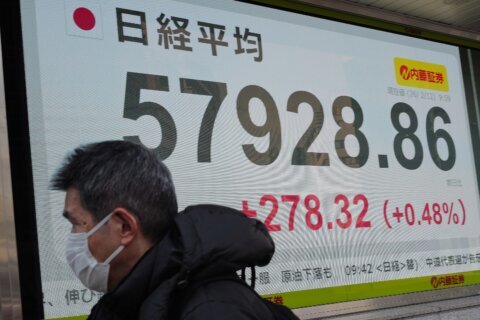SAN DIEGO (AP) — Dozens of migrants fleeing from Border Patrol agents led authorities to a surprising discovery over the weekend: A tunnel under the US-Mexico border in San Diego used to bring Chinese nationals illegally into the United States.
Drug cartels have built hundreds of tunnels to move drugs into California.
But it’s unusual to find such a large group of foreigners, especially from as far away as China, come out of an illegal border tunnel, Border Patrol agent Eduardo Olmos said. Agents detained 23 Chinese nationals and seven Mexicans.
“To say the least, this is definitely a significant event because of the amount of people,” Olmos said.
Agents first spotted a large group of men and women on a San Diego street near the Otay Mesa border crossing at about 1 a.m. on Saturday.
When agents headed toward them, the migrants ran toward a hole in the ground near a border fence. The hole was covered with a few branches and a wooden ladder led down to an underground passageway to Mexico.
Olmos said he did not know the tunnel’s length or dimensions. Agents captured 30 migrants, he said, but he did not know how many of those detained were grabbed while getting into the hole or whether any of them made it back into the tunnel and returned to Mexico.
Cartels have been sneaking drugs under the border for decades, especially after security was increased following the 9/11 attacks.
Many tunnels found by agents in San Diego have had lighting, ventilation and even railroad-type tracks so the drug cartels could efficiently move their loads into California. In Arizona, smugglers used to move migrants through storm drainage pipes that lie under the U.S.-Mexico border.
Smugglers in San Diego occasionally moved a few people through narrow, quickly excavated tunnels that authorities call “gopher holes.”
It was unclear how long the newest tunnel found had been there and how many may people have used it, but officials said it may have been built as an extension of a previously discovered incomplete tunnel found by Mexican authorities.
Most human smugglers have avoided building elaborate tunnels to move people because the trade was not as lucrative as smuggling drugs, said Mike Unzueta, the former head of investigations at U.S. Immigration and Customs Enforcement in San Diego.
Smugglers also wanted to avoid having their cargo — the people they were moving — expose their routes, like they did on Saturday.
But the event may indicate it has become profitable enough for them do so because Chinese nationals can pay up to $20,000 a person to be brought from their homeland to the United States, Unzueta said.
“You’re making a higher profit margin with Chinese nationals versus Mexican nationals,” Unzueta said.
Detentions of Chinese nationals crossing the border in the San Diego area has jumped from just four in 2013 to 48 in 2015 to 861 last year, Olmos said. So far 193 have been arrested since July 31 in the sector, including those apprehended over the weekend.
They are being held at a detention center while authorities review their cases, Olmos said. It was not known if a smuggler was among those detained.
U.S. authorities plan to seal the tunnel with cement but will first map it to determine its path between the countries.
Copyright © 2026 The Associated Press. All rights reserved. This material may not be published, broadcast, written or redistributed.







